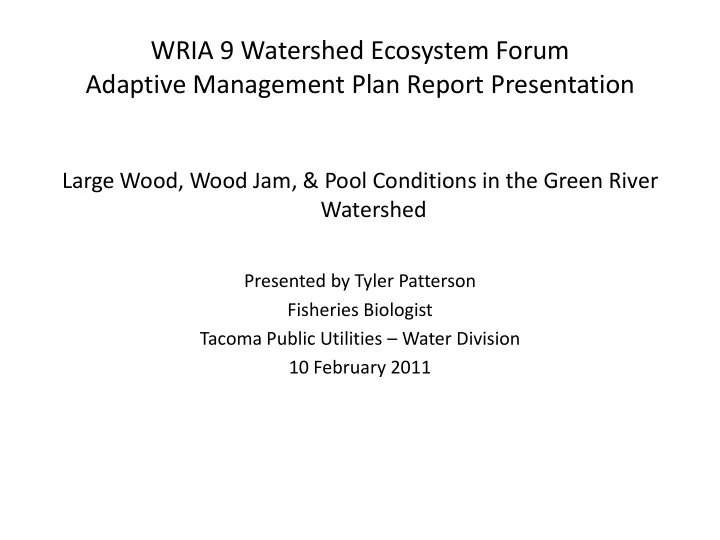

WRIA 9 Watershed Ecosystem Forum Adaptive Management Plan Report Presentation Large Wood, Wood Jam, & Pool Conditions in the Green River Watershed Presented by Tyler Patterson Fisheries Biologist Tacoma Public Utilities – Water Division 10 February 2011
Large Wood, Wood Jam, & Pool Conditions in the Green River Watershed Baseline large wood (LW), wood jam, and pool condition surveys for each subwatershed: • Duwamish Estuary – 2004 • Lower Green River – 2004 • Middle Green River – 2006 and 2007 • Upper Green River – 2005 Multi-year LW, wood jam, and pool condition survey comparison for the Middle Green subwatershed: • LW and wood jam comparison – 2001, 2006, and 2009 • Pool comparison – 2001 and 2007
Green River Subwatersheds
Baseline Large Wood Density by Subwatershed
Baseline Wood Jam Density by Subwatershed No jams observed
Baseline Pool Density by Subwatershed
Baseline Pool Depth by Subwatershed
Baseline Wood-Formed Pool Percentage by Subwatershed
Multi-Year Comparison of Large Wood Density in the Middle Green Subwatershed
Multi-Year Comparison of Wood Jam Density in the Middle Green Subwatershed
Multi-Year Comparison of Large Wood Density from RM 57 to RM 61 in the Middle Green Subwatershed
Multi-Year Comparison of Wood Jam Density from RM 57 to RM 61 in the Middle Green Subwatershed No wood jams observed
Multi-Year Comparison of Pool Density in the Middle Green Subwatershed
Multi-Year Comparison of Pool Depth in the Middle Green Subwatershed
Multi-Year Comparison of Wood-Formed Pool Percentage in the Middle Green Subwatershed
Summary Baseline large wood, wood jam, and pool conditions in Green River subwatersheds: • Lower Duwamish – low LW density, no jams, pool conditions unknown. • Lower Green – highest LW density, very few jams. high pool density, unknown pool depths, very few wood-formed pools. • Middle Green – moderate LW density, high jam density, low pool density, very deep bedrock scour pools, several wood-formed pools. • Upper Green – high LW density, highest jam density, highest pool density, numerous deep wood-formed pools.
Summary continued Multi-Year Comparison of LW, Wood Jam, and Pool Conditions in the Middle Green Subwatershed : • Substantial increase in LW and wood jam densities since 2001 through natural recruitment processes. • LW placed by Corps since 2004 is substantially increasing LW and jam densities from RM 57 to RM 61. • Placed LW has routed downstream as far as RM 39.5, but not forming jams. • LW input to the Middle Green River is dominated by natural recruitment. • Restoration sites like the Hamikami Levee Breach provide measurable amounts of LW to the Middle Green River. • Pool density decreased between 2001 and 2007.
References Anchor Environmental, LLC 2004. Lower Green River Baseline Habitat Survey Report. Prepared for WRIA 9 Technical Committee and King County Department of Natural Resources and Parks – Water and Land Resources Division. Landau Associates and TerraLogic GIS, Inc. 2004. Lower Duwamish Inventory Report. Prepared for WRIA 9 Steering Committee and Seattle Public Utilities. Patterson, T.H. 2010. Middle Green River Large Woody Material Monitoring – 2009 Data Report. Tacoma Public Utilities – Water Division. Tacoma, WA. R2 Resource Consultants. 2002. Green River Baseline Habitat Monitoring – 2001 Data Report. Prepared for U.S. Army Corps of Engineers, Seattle District. Technical Report. R2 Resource Consultants. 2007a. Upper Green River Habitat and Large Woody Debris Monitoring: 2005/2006 Data Report. Prepared for US Army Corps of Engineers. R2 Resource Consultants. 2007b. Middle Green River Large Woody Debris Monitoring: 2006 Data Report. Prepared for Tacoma Public Utilities. R2 Resource Consultants. 2008. Middle Green River Habitat and Large Woody Debris Monitoring: 2007 Data Report. Prepared for US Army Corps of Engineers and Tacoma Public Utilities – Water Division.
Recommend
More recommend